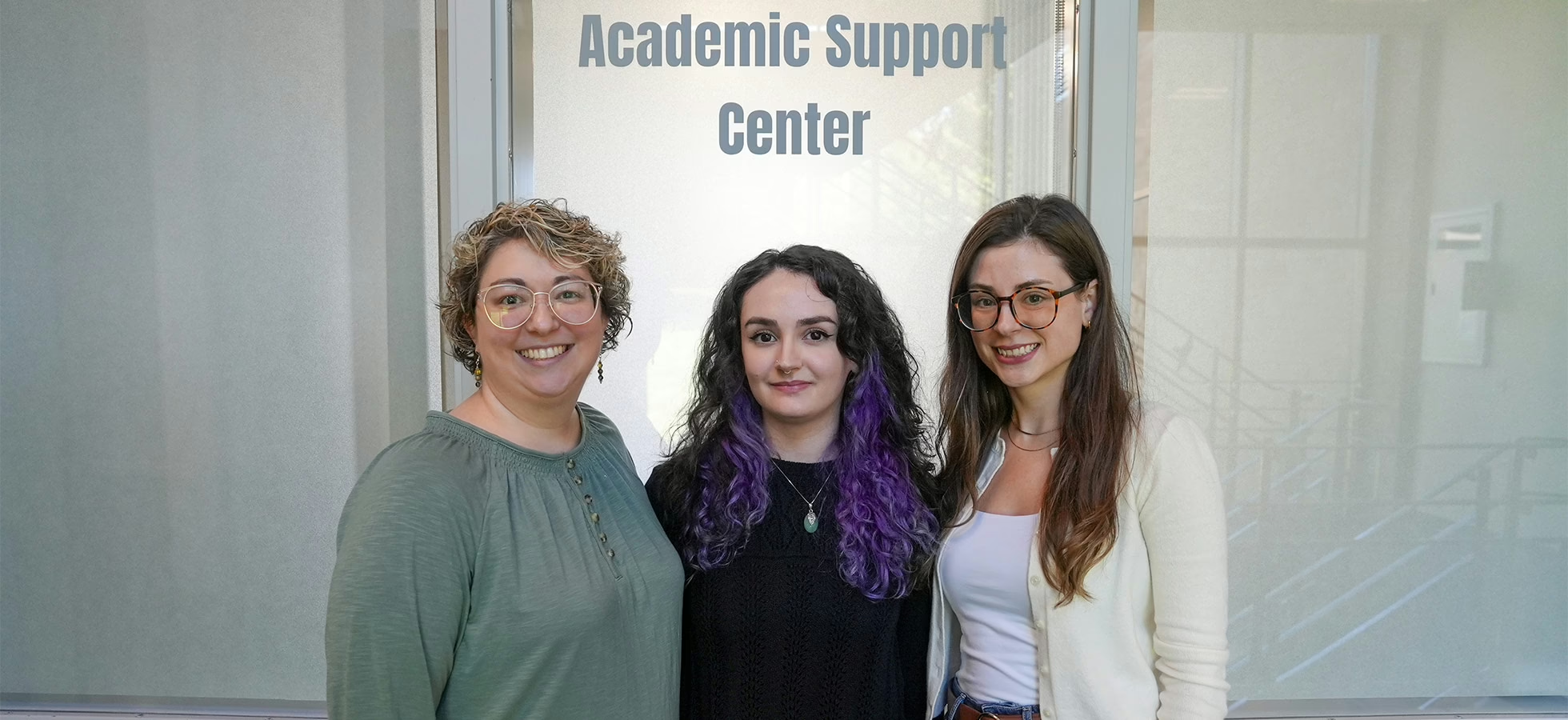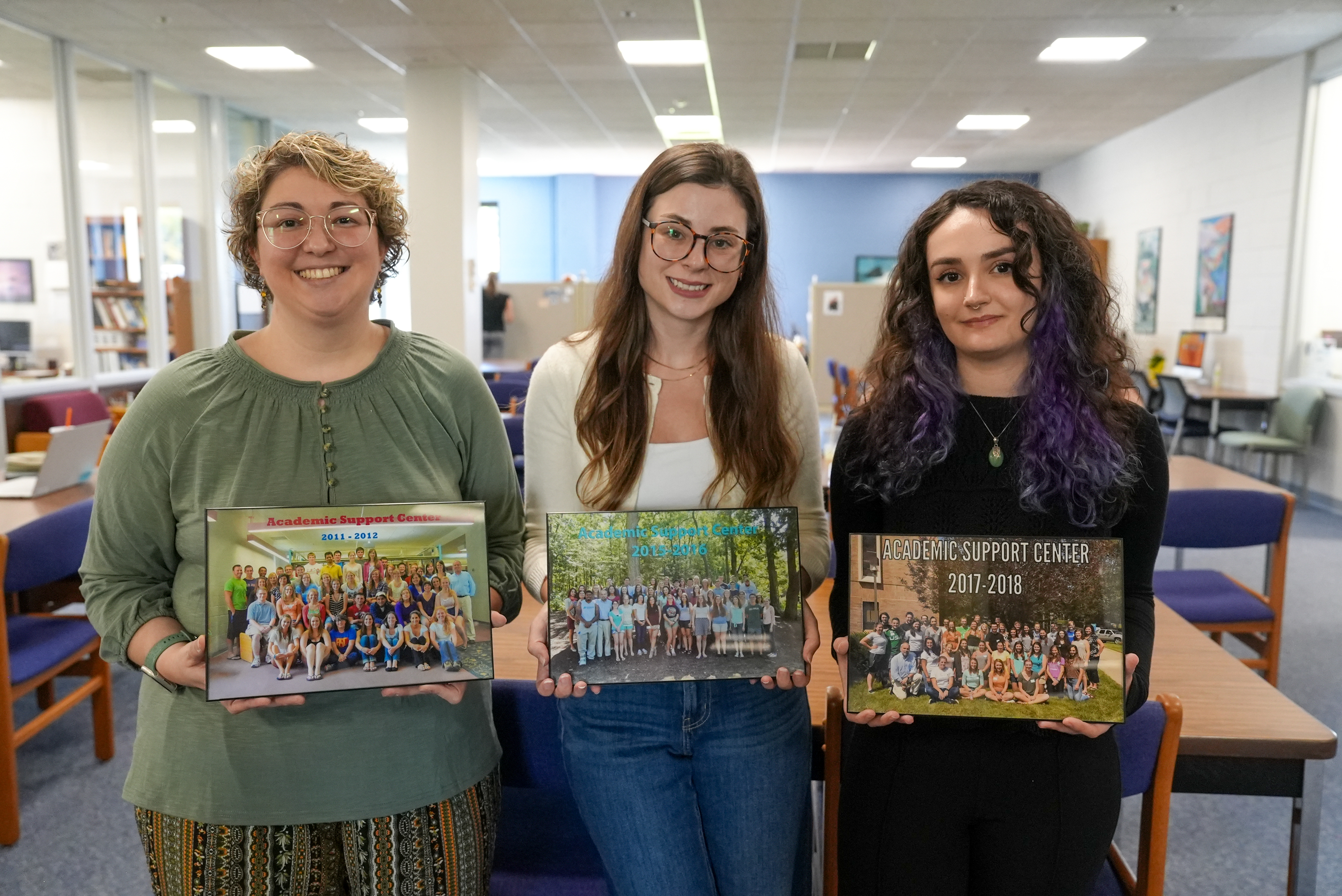“My Dream was Always to Come Back Here and Teach”: Former Tutors Reflect on Their Return as Faculty

The first semester of college is an exciting and challenging transition—but for Stephanie Bouley, Lauren Crockett-Girard, and Samantha Davis, it’s a little more like coming home. These three new visiting assistant professors are no strangers to Salisbury Street. In fact, all graduated from the University in recent years.
Bouley, Class of 2012, will teach in the biological and physical sciences department, Crockett-Girard, Class of 2019, will teach in the English department, and Davis, Class of 2016, will teach in the history department.
Beyond their connection as alumni, each served as a tutor in the Academic Support Center (ASC) during their time as students—an experience that shaped not only their individual journeys, but their academic and professional journeys too.
“In my first year at Assumption, as a commuter, I struggled to find community and to find my place,” says Crockett-Girard. “But as soon as I found the Academic Support Center, I felt like I had my comfortable place, my safe place. A place where I could talk to other tutors who were interested in studying fascinating things. I had a place to go every day where I knew I could talk to people, and they would know my name. I was drawn in by that feeling of community and belonging on campus.”
None of the three were certain that their careers would lead them back to teaching, but each credits Allen Bruehl, the former director of academic support, and Amy Hurley, the current director, for lighting the spark that brought them to where they are now.
“Allen and Amy helped jumpstart us all down the path of academia,” says Davis, noting that Bruehl and Hurley encouraged her to pursue her doctorate. “I had these acceptances to master’s programs in museum education, and after a conversation with a history professor and the support of Allen and Amy, I decided instead to do a Ph.D. in Latin American history.”
“Because I’m a first-generation college student, when I came to Assumption, I didn’t fully know what I was going to do,” says Bouley. “I wanted to conduct research, but I also thought I wanted to work with students. Tutoring gave me the opportunity to see if I enjoyed that experience—and of course, I did. Allen was also actually the one who helped me decide to do my Fulbright and go to Germany before graduate school.”
And while each took their own journey, Davis earning that Ph.D. in Latin American history from Pennsylvania State University; Crockett-Girard earning her Ph.D. in English from Boston College; and Bouley earning her Ph.D. in experimental and molecular medicine at Dartmouth College’s Geisel School of Medicine before teaching and working in the lab at Massachusetts General Hospital and Harvard University—each path led full-circle back to Assumption.
“When I went off to grad school, I always joked with my friends and family about how great it would be to come back and teach here,” says Crockett-Girard. “I got to teach at BC through my Ph.D. program, which was amazing, but I always had in the back of my head the thought of coming back for at least a semester. I wanted to have that experience with faculty that I worked with as a student and be on the other side of the classroom.”
“Two-thirds of my colleagues now taught me, which is a very surreal feeling, but it’s also a really comforting feeling. They know me, it’s very familiar,” says Bouley. “This was my dream from the moment I decided that I wanted to go the Ph.D. route. It was always to come back here and teach.”

Reflecting on their experience with the ASC, Bouley, Crockett-Girard, and Davis all encourage current Assumption students to reach out proactively for academic support or to consider exploring their own passion for teaching and mentorship by becoming tutors themselves.
“I told my students on the first day of class that I had been a tutor and that I had been tutored,” says Bouley. “I encouraged them to go and just make one appointment and see how it is. If you feel like you don’t need it, that’s great. If you feel like it’s helping you, then that’s great too. Even if there’s something that you feel like, ‘maybe I understand it,’ just getting someone else’s take on the material can make a world of difference. The hardest part is getting in the door.”
“Tutors also get tutoring from other tutors,” says Crockett-Girard. “I sought help for my graduate school application essays with another tutor. There’s no reason to feel like seeking help makes you a bad student or that you’re not prepared or equipped for college—it’s an opportunity to see another perspective and maybe get some advice and tips from somebody who has gone through the process with you.”
“It’s a judgment-free zone where your peers are also working through their own questions,” says Davis. “Everyone’s here to learn from each other. Your tutors are not necessarily experts, but they are able to help you, and maybe you can teach each other something. I remember there were students I learned a lot from as a tutor, rather than students just learning from me. It’s a peer tutoring center with the emphasis on peer—it really is a center of friends.”
Hurley, who helped spark the passion for teaching in each of these new faculty members, continues the good work of the ASC, which is staffed by about 40 tutors and accommodates around 5,000 total visits a year. The tutors go through a rigorous process, with each undergoing at least 16 hours of training, leading to national certification by the College Reading and Learning Association (CRLA). Assumption is one of the leading tutoring centers in the area, and one of a select few to offer three tutor certification levels offered to students.
“As a collaborative learning center, even when you’re not tutoring, you’re still a part of the work of learning and growing from and with each other,” says Hurley. “That’s always been our mission here and it always will be.”
